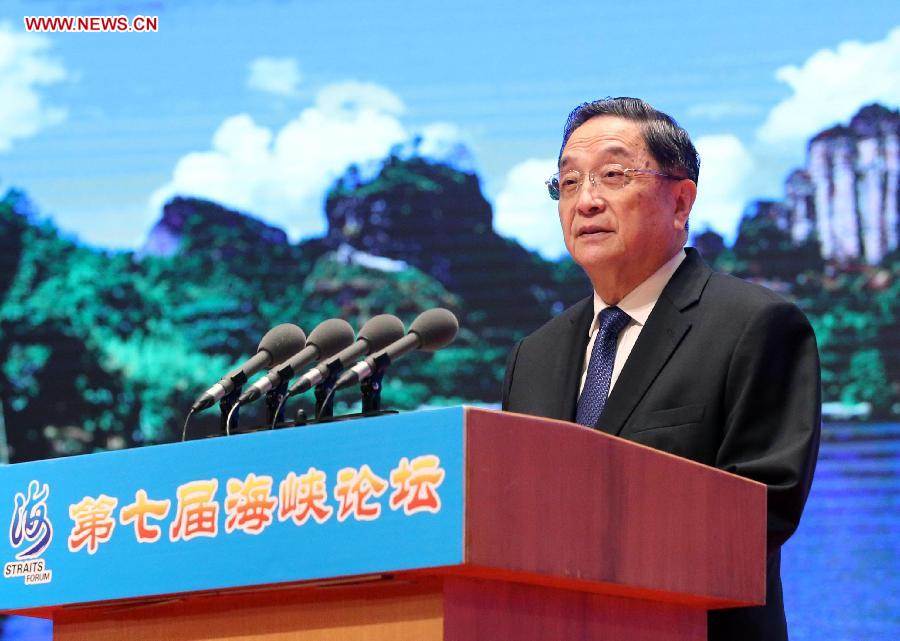
Yu Zhengsheng, chairman of the National Committee of the Chinese People's Political Consultative Conference, addresses the opening ceremony of the 7th Straits Forum in Xiamen, southeast China's Fujian Province, June 14, 2015. (Xinhua/Liu Weibing)
XIAMEN -- The Chinese mainland will remove entry permit requirements for Taiwan residents, as top political advisor Yu Zhengsheng vowed to boost exchanges across the Taiwan Strait on Sunday.
Yu, chairman of the National Committee of the Chinese People's Political Consultative Conference, announced the plan during a speech at the seventh Straits Forum, the largest annual event for cross-Strait exchanges, in Xiamen in the southeastern province of Fujian.
Currently, Taiwan residents must apply for a visa-like entry permit in order to visit the mainland.
Taibaozheng, a passport-like document that carries the entry permits for Taibao, or Taiwan compatriots, will also be made into a card, Yu said. The document also serves as identification during a Taiwan residents' stay on the mainland.
The plan to offer the permit-free policy was announced as Yu promised to create better conditions for cross-Straits exchanges.
"We'll continue to expand people-to-people exchanges across the Strait and engage more Taiwan compatriots in the trend of cross-Strait interaction," Yu said.
EASIER ACCESS
Attendees of the Straits Forum said the permit-free policy would make it much easier for Taiwan residents to visit the mainland, good news for booming cross-Strait tourism, business and grassroots exchanges.
Taiwan and the mainland broke off communication in 1949, after the Kuomintang (KMT) lost a civil war with the Communist Party of China and fled to the island.
Cross-Strait exchanges and travels only became widely possible after 2008, when the KMT adopted mainland-friendly policies and the two sides opened direct mail, transport and trade links.
As another breakthrough of cross-Strait ties, the Chinese mainland began to allow residents in certain cities to visit Taiwan as individual tourists in 2011 in a friendly bid to boost Taiwan's tourism. So far, residents in 47 cities have been given such permits.
Official statistics show in 2014, Taiwan residents made 5.37 million visits to the mainland, up from 4.36 million in 2008. Mainlanders made 4.04 million visits to Taiwan last year, compared with 280,000 in 2008.
"It (permit-free policy) will not only bring simpler procedures but also narrow the psychological distance between the sides," Cheng An-guo, a senior KMT official, told Xinhua.
Wei Cheng-tai, president of a Taiwan-based interior design company, said easier access would enhance the mainland's appeal to Taiwan youth, many of whom are attracted by the bigger market and greater business potential on the other side of the Strait.
The mainland has been increasingly drawing Taiwanese job seekers who complain of low and "frozen salaries" on the island. A poll conducted by Taiwan-based TVBS earlier this year indicated about one third of Taiwan residents aged between 20 and 29 are interested in working on the mainland.
TACKLING MISUNDERSTANDINGS
The plan to drop the entry permit requirement also demonstrates Chinese leaders' continued focus on people-to-people exchanges across the Strait.
At the opening ceremony of the forum, Yu acknowledged problems in current cross-Strait communication, noting the island's "separatist force" is still the biggest obstacle for peaceful development of the cross-Strait relations.
"We'll consistently support exchanges among compatriots of the two sides and firmly oppose the separatist forces' obstructive intent to the peaceful development of the relations," he said.
"It's common that people across the Strait have different perceptions over some issues, given different historical experiences they have encountered, and different social and political systems they live with. It's understandable that some Taiwan compatriots still harbor misgivings on the development of the cross-Strait relations," he said.
It is the existing differences that highlighted the necessity of exchanges across the Strait, the leader added.
In March 2014, Taiwanese students seized the headquarters of the island's legislative body in protest against what they saw as the undemocratic methods KMT employed to push a mainland-Taiwan service trade pact and its negative impact on Taiwan's economy and society.
The protest prompted concerns over the misunderstanding against the mainland among the Taiwan public, highlighting the need for deepening cross-Strait exchanges.
Xi Jinping, while meeting KMT chairman Eric Chu in the capacity of the general secretary of the Communist Party of China (CPC) Central Committee in May, stressed "people-to-people exchanges" and "heart-to-heart communication" across the Strait.
He called for respecting disparities, deepening mutual understanding and enhancing cultural and national identification.
In Sunday's speech, Yu encouraged more grassroots exchanges and friendship-building by young people on both sides, who he described as possessing "boundless creativity."
Hau Lung-pin, vice chairman of Taiwan's ruling Kuomintang (KMT) party, who attended the event, agreed by saying that only interaction between ordinary people can secure a peaceful and stable cross-Strait development.